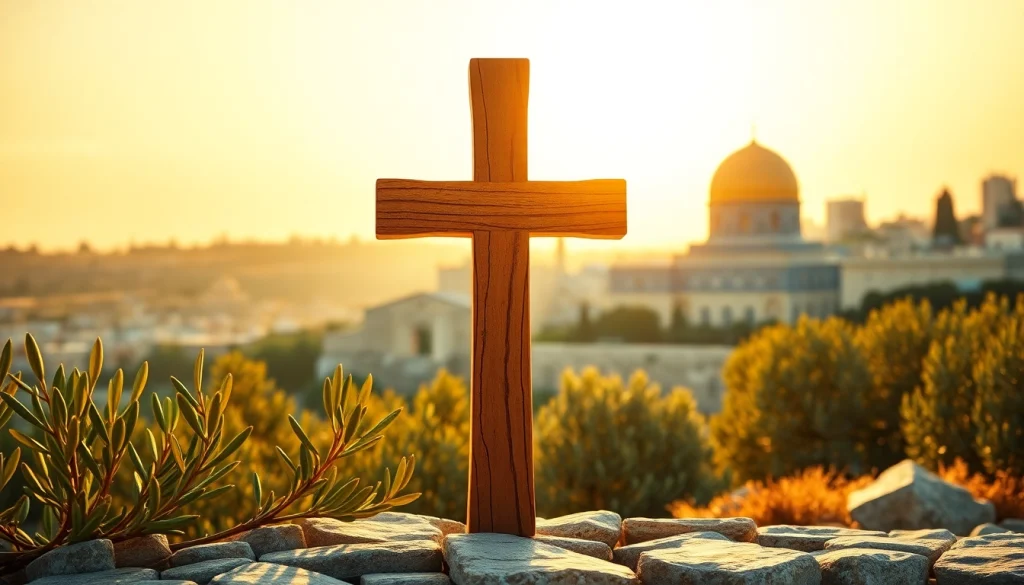What Are Jerusalem Crosses?
The Jerusalem cross is an emblem of rich symbolism and historical significance. It features a large central cross with four smaller crosses in each quadrant. This design is not only visually striking but also steeped in meaning, representing pivotal aspects of the Christian faith, particularly for those connected to Jerusalem. The Jerusalem crosses serve as a testament to the city’s spiritual legacy and the spreading of the Gospel worldwide.
Historical Context of Jerusalem Crosses
The history of the Jerusalem cross can be traced back to the early Crusader period in the 11th century. It was used by the Kingdom of Jerusalem, established during the First Crusade, and served as a banner for the crusaders. The cross symbolizes the four gospels—Matthew, Mark, Luke, and John—as well as the teachings of Jesus Christ being disseminated across the globe.
As a heraldic device, the Jerusalem cross has undergone various interpretations through centuries, often embodying faith, devotion, and conquest. Its usage has evolved, but it decidedly resonates within the Christian communities, drawing pilgrims and historians alike to explore its layered meanings.
Symbolism Behind the Design of Jerusalem Crosses
The overarching symbolism of the Jerusalem cross is multifaceted. The large central cross represents Christ and His mission, while the four smaller crosses represent the four evangelists who preached His word. Together, they symbolize the spread of Christianity throughout the four corners of the earth, embodying the call for all nations to embrace the Gospel.
Additionally, the design reflects a deeper theological significance. The large central cross emphasizes Christ’s sacrifice, while the smaller crosses signify His followers—the apostles and early believers—spreading His teachings. This intricate design transforms the Jerusalem cross into more than a mere emblem; it becomes a narrative of faith, linking the past with the present.
Different Types of Jerusalem Crosses Available
Jerusalem crosses come in various styles, each suited for specific uses and preferences. Some common variations include:
- The Traditional Jerusalem Cross: This version typically consists of a wooden or metal cross with the characteristic five-cross design.
- Jewelry Pieces: Jerusalem crosses are often crafted into necklaces and pendants, functioning as a personal expression of faith.
- Artistic Representations: Some artists create decorative versions of the cross, employing various materials such as ceramic, glass, or stone, suitable for display in homes or churches.
- Religious Artefacts: Crosses utilized within religious practices can vary in size and material, including ornate designs for use in ceremonies.
The Cultural Impact of Jerusalem Crosses
Jerusalem crosses have not only been religious symbols but also have permeated cultural expressions and artistic representations throughout the ages. Their distinct design and historical tale offer opportunities for exploration beyond mere ornamentation.
Religious Significance for Christians
For Christians, the Jerusalem cross holds profound significance. It is a reminder of their faith’s roots and the call to evangelization. Its presence in a myriad of Christian contexts—from personal homes to monumental churches—underscores a sense of belonging to a larger community of believers. Furthermore, it acts as a touchstone for discussions surrounding faith, identity, and spirituality.
Artistic Representations of Jerusalem Crosses
Over centuries, the Jerusalem cross has inspired countless works of art. From mosaics and paintings in ancient churches to modern sculptures, artists have employed this symbol to convey religious narratives and cultural identity. Notable examples include:
- Mosaics in Historic Churches: Certain basilicas in Jerusalem proudly feature mosaics of the Jerusalem cross, integrating it into the fabric of sacred architecture.
- Contemporary Art: Modern interpretations vary from abstract depictions to mixed media works, showcasing how the symbol adapts to different cultural contexts.
Modern Adaptations and Popularity
In recent years, the Jerusalem cross has garnered renewed interest, not only within religious communities but also among individuals seeking meaningful symbols for personal expression. Its adoption in jewelry and fashion trends signifies a blend of spiritual heritage with contemporary culture. This resurgence of popularity highlights the enduring significance of the Jerusalem cross and its relevance in today’s society.
How to Choose a Jerusalem Cross
Choosing a Jerusalem cross is a personal journey, and it can be influenced by various factors, including the purpose of the cross, personal beliefs, and aesthetic preferences. Here are some essential considerations:
Factors to Consider When Selecting a Cross
When selecting a Jerusalem cross to purchase, consider the following elements:
- Intended Use: Determine whether the cross will be for personal wear, decorative purposes, or a ceremonial item.
- Meaning and Resonance: Reflect on what the cross represents; its spiritual significance should align with your beliefs.
- Aesthetic Preference: Consider your style preferences—be it minimalist, ornate, modern, or traditional.
Common Materials Used in Jerusalem Crosses
Jerusalem crosses can be made from a variety of materials, each offering a unique texture and visual appeal. Some commonly used materials include:
- Wood: Olive wood is particularly popular, owing to its connection to the Holy Land.
- Metal: Silver, gold, or bronze options provide a range of choices for jewelry and decorative items.
- Stone: Many artisans carve Jerusalem crosses from local stones, giving them a distinct authenticity.
Choosing the Right Size and Style for Your Needs
When selecting a Jerusalem cross, size and style are important considerations. A cross worn as jewelry should correspond with your typical attire, while a decorative cross’s size should match the space it occupies. For instance, a larger cross might serve as an impactful focal point in a living room, while a smaller version could be a subtle addition on a nightstand.
Where to Purchase Authentic Jerusalem Crosses
Access to authentic Jerusalem crosses can enhance the experience of owning one. The authenticity often correlates with the quality and meaning behind the piece. Here are some recommended avenues for finding authentic crosses:
Online Stores for Jerusalem Crosses
Several reputable online retailers specialize in religious artifacts and specifically Jerusalem crosses, ensuring authenticity and quality. Many offer a range of styles and materials:
- Holy Land Gift Shop: This store provides a selection of intricately designed crosses made by local artisans.
- Monastery Icons: Here you can find beautifully crafted crosses available for personal and ceremonial use.
Local Shops in Jerusalem and the Holy Land
A visit to Jerusalem offers a unique opportunity to purchase crosses directly from artisans and religious shops, ensuring authenticity. Markets along the Via Dolorosa often host vendors selling handmade items, where you can engage with artisans and share in the history of the items.
Recognizing Quality and Authenticity in Crosses
When purchasing a cross, how can you ensure its quality? Look for signs of craftsmanship, such as intricate details and the quality of materials used. Genuine olive wood pieces will often display natural grain variations. Additionally, inquire about the source of the cross; reputable sellers should be able to provide this information.
FAQs About Jerusalem Crosses
What Do the Smaller Crosses Represent?
The four smaller crosses surrounding the central cross are traditionally understood to represent the Four Evangelists of Christianity: Matthew, Mark, Luke, and John. Furthermore, they symbolize the spread of the Gospel and Christ’s message to the four corners of the world, forming a visual narrative of faith and outreach.
Are Jerusalem Crosses only for Christians?
While the Jerusalem cross is predominantly recognized within the Christian faith, its artistic and cultural significance can resonate with individuals of various backgrounds. As a symbol of peace, devotion, and history, it can appeal to a broader audience interested in the rich heritage of Jerusalem and its diverse narratives.
Is the Jerusalem Cross Controversial?
The Jerusalem cross has been subject to various interpretations over the years. While it holds deep meaning within Christianity, some perspectives may characterize it differently in contemporary contexts. Awareness of its historical significance and sensitivity to diverse viewpoints can foster respectful discussions surrounding its use and portrayal.


